(完整版)外研版七年级下册英语Module3Makingplans知识点及练习(有答案).docx
外研版英语七下第三模块《Making plans》重要知识点总结

第三模块:M3: Making plansM3U1:1.go ove r(adv.)“复习(功课等)”;“仔细审查/检查某物(试卷等)”。
是“动词+副词”型的短语,名词作宾语时,放在over前后均可;代词作宾语时,必须放在go与over之间。
如go it/them over 复习一下它/它们。
与go有关的其它短语:go by(时间)流逝 go on 继续;进行 go off离开(尤指为了做某事);(闹铃)发出响声 go away走开go ahead先走;(口语)请吧;说吧 go wrong出毛病go out外出;熄灭 go to bed去睡觉go to school/church/work去上学/去做礼拜/去上班go back 返回 go back to (doing sth.)重新开始,又接着做2.plan(动词) to do sth计划/打算做某事=make a plan(名词)/plans(名词) to do sthplan(名词) for(doing) sth. “(做)......的计划”eg.The plan for the picnic is very good.野餐的计划很棒。
They are talking about their plan for buying a new house.他们正在谈论买新房的计划。
3.on/at the weekend=on/at weekends在周末4.see/watch a movie(美式英语常用)/film(英式英语常用)=go to the movies/ the cinema看电影5.have a picnic=go for a picnic举行野餐have a ...(学科)class/lesson/上一节......课have a good/nice/fantastic time 玩得开心;过得愉快have a look看一看 have a rest休息一会儿have a (class) meeting开(班)会have breakfast/lunch/supper/dinner吃早/中/晚饭6.help with the housework=help (to) do housework帮忙做家务7.on March 16/Saturday morning/a cold winter evening 在三月十六号/周六上午/在一个寒冷的冬天的晚上,表示具体到几月几号;周几的上、下午或者晚上;某个特定条件的日子,用介词on。
外研版七年级英语下册模块3知识点归纳

外研版七年级英语下册模块3知识点归纳Module 3: Making PlansIn this module。
we will learn some useful phrases and words related to making plans.Phrases:1.Have a ic - to go for a ic2.Check one's email - to see if there are any new emails3.Go over - to review or revise4.On Sunday morning - during Sunday morninga movie - to watch a movie6.In the park - inside the park7.Have a piano lesson - to attend a piano class8.Make friends - XXX9.Enjoy myself - to have a good time10.Go out with sb。
- to go out with someone11.Take a walk - to go for a walk12.Summer holiday - the summer break from school13.Go on a summer camp - to attend a summer camp14.Do some sightseeing - to visit tourist ns15.Look forward to sth - to be excited about something16.On the beach - at the beach17.Collect litter - to clean up XXXWords:1.On Saturday morning - during Saturday morning2.Else - other or anotherFor example。
七年级英语下册 Module3 Making plans模块语法专练课时作业外研版

Module 3 Making plans模块语法专练一般将来时:begoingto1.概念:表示打算、计划或准备做某事。
常用的时间状语有tomorrow,nextday/week/month/year...,soon,the day after tomorrow等。
2.肯定句:主语+be going to+动词原形+其他。
例如:Iamgoingtotakeawalkafterdinner.我打算晚饭后去散步。
3.否定句:主语+be not going to+动词原形+其他。
例如:I’mnotgoingtohaveapicnicthisafternoon.我不打算今天下午去野餐。
4.一般疑问句: be+主语+going to+动词原形+其他?例如:Areyougoingtogoonanoutingthisweekend?你这个周末打算出去吗?5.特殊疑问句:特殊疑问词+be+主语+going to+动词原形+其他? 例如:Whatareyougoingtodowithyourfriendthisafternoon?你和你朋友打算今天下午做什么?6.there be 句型的一般将来时的结构:There is/are going to be+其他。
这种结构常用来表示“将有某事发生”。
注意:句型中going to后面的be不能改为助动词have或has。
例如:Thereisgoingtobeaschoolmeetingthisafternoon.今天下午将召开学校大会。
Ⅰ.按要求完成句子,每空一词1.Nancy is going to have a picnic.(改为否定句)Nancy isn’t going to have a picnic.2.I’m going to get up at 6:30 tomorrow.(改为一般疑问句)Are you going to get up at 6:30 tomorrow?3.We are going to meet at the bus stop at 10:30.(对画线部分提问)When are you going to meet at the bus stop?4.She is going to listen to music after school.(对画线部分提问)What is she going to do after school?5.My father and mother are going to see a play the day after tomorrow.(对画线部分提问)Who are going to see a play the day after tomorrow?Ⅱ.根据句意用所给词的适当形式填空1.I am(be) tired.I am going to have (have) a rest at home today.2.Mary’s birthday is next Monday.Her mother is going to give(give) her a present on that day.3.It is very cold these days.It is going to snow(snow) soon.4.—Are you going to be(be) here this Saturday?—No.I am going to visit(visit) my teacher.5.I am afraid there is going to be(be) a meeting this afternoon.I can’t join you.。
外研版七年级下册英语Module3Makingplans分课时练习(含答案)

外研版英语七年级下册Module 3 Making plans◎第1课时Unit1 What are you going to do at the weekend?一、用括号内所给词的适当形式填空。
1. My mother’s birthday is coming. I _____ (buy) apresent for her.2. Li Ming is going to _______ (do) his homework.3. Do you plan ______ (play) table tennis?4. Is ______ (somebody) here?5. Look! It _______(rain) soon.二、从方框中选择恰当的短语填空,有的需要变换形式。
2. The students are going to _________ next week.3.Betty is going to _______ home and watch TV alone .4. Does your mother often _________ at home?5. Lucy is going to _______ her lessons for tomorrow’s exam.三、单项选择。
1. —______are they going to do?—They are going to have a picnic.A. WhatB. WhereC. WhoD. Why2. My mother usually gets up______ five fifty.A. atB. onC. inD. for3. —Ann is in hospital.—Yes, I know. I ______ her tomorrow.A. visitB. go visitingC. go to visitD. am going to visit4. —Look! There are so many people in the park. —Nobody likes to stay at home ______ Sunday morning.A. atB. onC. inD. for5. —Would you like to go out to play football with us? —______, but I should finish my homework first.A. Yes, I doB. I likeC. Of course notD. I’d like to四、句型转换1. He plays table tennis every afternoon. (用this afternoon改写)He _____ ______ _____ play table tennis this afternoon.2. My sister is going to revise(复习) her lessons this afternoon. (改为同义句)My sister is going to _____ _____ her lessons this afternoon.3. I am going to check my email tomorrow. (对画线部分提问) _____ are you ______ ______ ______ tomorrow?4. She is going to buy some books. (改为否定句)She _________ _________ going to buy any books. 5.Would you like to join us? (做出肯定回答)Yes,________ ________ ________.五、根据汉语意思完成下列英语句子,每空一词。
新版外研版初一下第三单元Making_plans知识点详解

Unit 3 Making plans 【重点单词短语】1. have a picnic _______________2. look forward to _______________3. enjoy oneself _______________4. take a walk _______________5. go sightseeing _______________6. stay in bed _______________7. go swimming _______________8. at the weekend _______________9. On Saturday morning _______________10.see a movie _______________11.have a piano lesson _______________【基本句型】1. What are you going to do at the weekend, Daming?2. On Saturday morning, I’m going to check my email and do my homework.3. Who else is going to be there?4. Would you like to join us?5. Are we going to meet here?6. What are your plans for the weekends?7. This year is going to be very different because I’m going on a summer camp in Sydney, Australia.8. Don’t be silly!9. I hope they win the match!Step2重点难点解析1. picnic n.野餐如:---Let’s have a picnic.---That’s a good idea.与此类此的短语还有:have a meeting 开会have a walk 散步have a rest 休息have a fight 打架2. housework n.家务劳动housework是不可数名词。
外研版七年级下Module-3-知识点总结
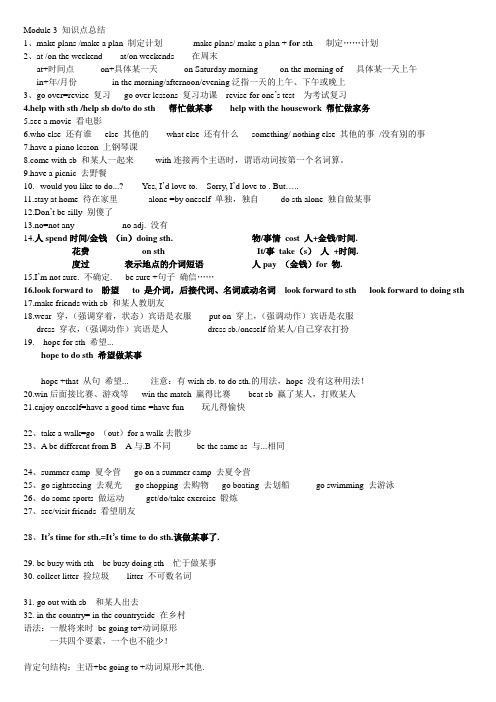
Module 3 知识点总结1、make plans /make a plan 制定计划make plans/ make a plan + for sth 制定……计划2、at /on the weekend at/on weekends 在周末at+时间点on+具体某一天on Saturday morning on the morning of 具体某一天上午in+年/月份in the morning/afternoon/evening泛指一天的上午、下午或晚上3、go over=revise 复习go over lessons 复习功课revise for one’s test 为考试复习4.help with sth /help sb do/to do sth 帮忙做某事help with the housework 帮忙做家务5.see a movie 看电影6.who else 还有谁else 其他的what else 还有什么something/ nothing else 其他的事/没有别的事7.have a piano lesson 上钢琴课e with sb 和某人一起来with连接两个主语时,谓语动词按第一个名词算。
9.have a picnic 去野餐10.--would you like to do...? --Yes, I’d love to. Sorry, I’d love to . But…..11.stay at home 待在家里alone =by oneself 单独,独自do sth alone 独自做某事12.Don’t be silly 别傻了13.no=not any no adj. 没有14.人spend时间/金钱(in)doing sth. 物/事情cost 人+金钱/时间.花费on sth It/事take(s)人+时间.度过表示地点的介词短语人pay (金钱)for 物.15.I’m not sure. 不确定. be sure +句子确信……16.look forward to 盼望to 是介词,后接代词、名词或动名词look forward to sth look forward to doing sth17.make friends with sb 和某人教朋友18.wear 穿,(强调穿着,状态)宾语是衣服put on 穿上,(强调动作)宾语是衣服dress 穿衣,(强调动作)宾语是人dress sb./oneself给某人/自己穿衣打扮19. hope for sth 希望...hope to do sth 希望做某事hope +that 从句希望... 注意:有wish sb. to do sth.的用法,hope 没有这种用法!20.win后面接比赛、游戏等win the match 赢得比赛beat sb 赢了某人,打败某人21.enjoy oneself=have a good time =have fun 玩儿得愉快22、take a walk=go (out)for a walk去散步23、A be different from B A与.B不同be the same as 与...相同24、summer camp 夏令营go on a summer camp 去夏令营25、go sightseeing 去观光go shopping 去购物go boating 去划船go swimming 去游泳26、do some sports 做运动get/do/take exercise 锻炼27、see/visit friends 看望朋友28、It’s time for sth.=It’s time to do sth.该做某事了.29. be busy with sth be busy doing sth 忙于做某事30. collect litter 捡垃圾litter 不可数名词31. go out with sb 和某人出去32. in the country= in the countryside 在乡村语法:一般将来时be going to+动词原形一共四个要素,一个也不能少!肯定句结构:主语+be going to +动词原形+其他.否定句结构:主语+be not going to +动词原形+其他.一般疑问句:be动词提前Be +主语+going to +动词原形+其他?肯定回答:Yes,主语+be.否定回答:No,主语+be not.注意:表示计划到某地去,谓语动词go与going重复,一般只说be going to +地点.。
初中英语外研版七年级下册M3U3预习指导(知识点+练习题)

八年级英语下册M3U3预习指导一、知识点一、语法:现在完成时(二)1.现在完成时与一般过去时的区别:(1)二者意义上的区别:现在完成时表示过去发生的某一动作对现在造成的影响或结果,强调现在的情况,它与现在有密切的关系。
它不是从时间上就是从结果上和现在联系了起来,不能和表示过去的时间状语连用。
一般过去时只表示过去的动作或状态,和现在不发生关系。
(2)时间状语上不同:现在完成时的时间状语有:already, yet, still, ever, so far(到目前为止), recently, these days/weeks/years, since +时间点, for + 时间段, in the last/past (few years)等。
一般过去时的时间状语有:yesterday ~系列;last ~ 系列;~ago系列;in + 过去时间;及上下文暗示或其他一些特殊的时间状语Eg: (1) I have already seen the film.(强调我已经知道电影的内容)我已经看过这部电影了。
(2) I saw the film last week. (强调我看电影的动作)我上周看了这部电影。
2.have been to …去过某地(已经回来了)have gone to…去了某地(还没有回来)have been in…曾住在某地Eg: (1) I have been to Beijing twice.我去过北京两次。
(2) He has gone to Beijing.他去北京了(还没有回来)。
(3) She has been in Beijing for 3 years.她在北京住了三年。
3.already, yet, ever, still在现在完成时中的区别:already“已经”用于肯定句中,与现在完成时连用,already不用于否定句中,但可用于疑问句中,表示期待对方做出明确或表示惊讶,此时already位于句末yet“已经”与现在完成时连用,用于否定句或疑问句中,位于句末,可与not连用表示“还没有”ever“曾经”用于现在完成时中,用于否定句、疑问句、比较结构或带if的句子中still“至今还,现在仍然”用于肯定句中Eg: (1) I have already seen the film.我已经看过这部电影了。
最新外研版七年级下册英语Module-3Making-plans知识点及练习(有答案)

Module 3 Making plans 重点词汇讲解1.on Saturday morning在周六上午【考点分析】辨析on, in, at在表示时间时的区别on表示在具体的某一天或具体某一天的上午、下午或晚上。
on May Day在五一劳动节;on Sunday afternoon在周日下午in后跟年、月、季节、世纪,或泛指的上午、下午或晚上等。
in 1997 在1997年;in May 在五月;in the morning在早上at表示在具体的几点钟at five o’clock 在五点;at half past six 在6:30;at a quarter past two 在2:15【例题】①—Hi,Susan,when is Teachers’Day in China?—It’s ________ September 10th . 【B】A.in B.on C.at D.For②We usually have the first class________8:00 in the morning . 【D】A.of B.in C.on D.at2.else/els/adj . 别的,其他的adv . 另外,其他【考点分析】else作形容词时一般用在不定代词(something, anything, nobody, somebody等)或疑问代词(who, what等)之后;作副词时一般用在不定副词(somewhere,anywhere等)或疑问副词(where,how等)之后。
eg:I’m going to take you somewhere else . 我将要带你去别处。
What else did he say?他还说了些什么?Where else did you go in the summer vacation?暑假你还去了哪儿?3.plan /plæn/ n.计划,打算【考点分析】①plan 为可数名词。
(完整)外研版七年级下册英语Module3Makingplans知识点及练习(有答案),推荐文档
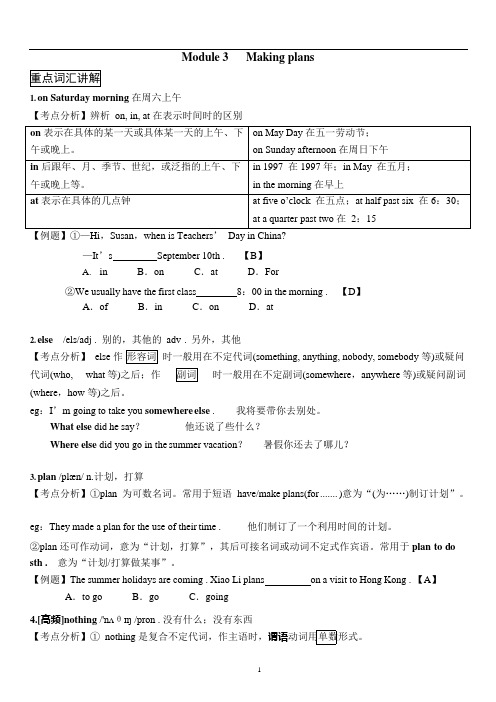
副词重点词汇讲解Module 3Making plans1. on Saturday morning 在周六上午【考点分析】辨析 on, in, at 在表示时间时的区别—It ’sSeptember 10th . 【B 】 A. inB .onC .atD .For②We usually have the first class8:00 in the morning . 【D 】 A .ofB .inC .onD .at2. else/els/adj . 别的,其他的 adv . 另外,其他【考点分析】 else 作 代词(who,what 等)之后;作(where ,how 等)之后。
时一般用在不定代词(something, anything, nobody, somebody 等)或疑问时一般用在不定副词(somewhere ,anywhere 等)或疑问副词eg :I ’m going to take you somewhere else .我将要带你去别处。
What else did he say ?他还说了些什么?Where else did you go in the summer vacation ?暑假你还去了哪儿?3. plan /plæn/ n.计划,打算【考点分析】①plan 为可数名词。
常用于短语 have/make plans(for ....... )意为“(为……)制订计划”。
eg :They made a plan for the use of their time .他们制订了一个利用时间的计划。
②plan 还可作动词,意为“计划,打算”,其后可接名词或动词不定式作宾语。
常用于 plan to do sth . 意为“计划/打算做某事”。
【例题】The summer holidays are coming . Xiao Li planson a visit to Hong Kong . 【A 】A .to goB .goC .going4.[高频]nothing /'nʌθɪŋ /pron . 没有什么;没有东西【考点分析】① nothing 是复合不定代词,作主语时,谓语动词用单数形式。
外研版七年级英语下册 Module 3课后练习(含答案)
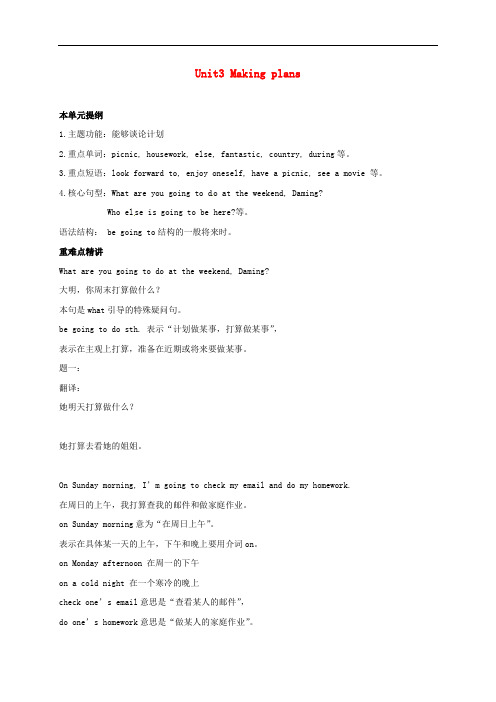
Unit3 Making plans本单元提纲1.主题功能:能够谈论计划2.重点单词:picnic, housework, else, fantastic, country, during等。
3.重点短语:look forward to, enjoy oneself, have a picnic, see a movie 等。
4.核心句型:What are you going to d o at the weekend, Daming?Who el se is going to be here?等。
语法结构: be going to结构的一般将来时。
重难点精讲What are you going to do at the weekend, Daming?大明,你周末打算做什么?本句是what引导的特殊疑问句。
be going to do sth. 表示“计划做某事,打算做某事”,表示在主观上打算,准备在近期或将来要做某事。
题一:翻译:她明天打算做什么?她打算去看她的姐姐。
On Sunday morning, I’m going to check my email and do my homework.在周日的上午,我打算查我的邮件和做家庭作业。
on Sunday morning意为“在周日上午”。
表示在具体某一天的上午,下午和晚上要用介词on。
on Monday afternoon 在周一的下午on a cold night 在一个寒冷的晚上check one’s email意思是“查看某人的邮件”,do one’s homework意思是“做某人的家庭作业”。
题二:翻译:今天下午我的妈妈打算查看她的电子邮件。
----When did the earthquake in Lushan happen?----It happened_____8:02_____the morning of April 20,2013.A. on; inB. at; inC. at; onD. on; onWho else is going to be there?还有谁打算去那里?本句是由who引导的特殊疑问句,其中else作为副词,意为“其他,另外”,位于特殊疑问词之后。
外研-七年级下册-学生版-Module3
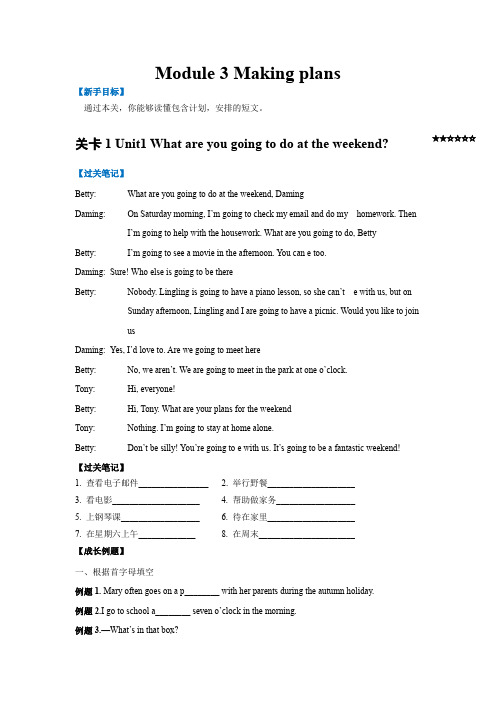
Module 3 Making plans【新手目标】通过本关,你能够读懂包含计划,安排的短文。
★★☆☆☆☆关卡1 Unit1 What are you going to do at the weekend?【过关笔记】Betty: What are you going to do at the weekend, DamingDaming: On Saturday morning, I’m going to check my email and do my homework. ThenI’m going to help with the housework. What are you going to do, BettyBetty: I’m going to see a movie in the afternoon. You can e too.Daming: Sure! Who else is going to be thereBetty: Nobody. Lingling is going to have a piano lesson, so she can’t e with us, but onSunday afternoon, Lingling and I are going to have a picnic. Would you like to joinusDaming: Yes, I’d love to. Are we going to meet hereBetty: No, we aren’t. We are going to meet in the park at one o’clock.Tony: Hi, everyone!Betty: Hi, Tony. What are your plans for the weekendTony: Nothing. I’m going to stay at home alone.Betty: Don’t be silly! You’re going to e with us. It’s going to be a fantastic weekend!【过关笔记】1. 查看电子邮件________________2. 举行野餐____________________3. 看电影____________________4. 帮助做家务__________________5. 上钢琴课__________________6. 待在家里____________________7. 在星期六上午_____________ 8. 在周末______________________【成长例题】一、根据首字母填空例题1. Mary often goes on a p________ with her parents during the autumn holiday.例题2.I go to school a________ seven o’clock in the morning.例题3.—What’s in that box?—N________. They took away all the things in it. It’s empty.例题4. It’s going to be a f________ weekend.例题5. I go to school at 6:45 in the m________.二、用所给单词的正确形式填空例题1. The weather was very _________. Let’s go for an outing. (fantasy)例题2. The girl is still doing her homework. She ___________________ (not finish) it yet.例题3.He is a basketball fan and he always gets the _________________ (late) news about NBA.例题4.They got up early in order ______________ (catch) up with the early bus.例题5.Has your brother __________________ (reach) America yet?【过关练习】一、完成句子1.别担心。
外研版英语七下第三模块《Makingplans》重要知识点总结

外研版英语七下第三模块《Makingplans》重要知识点总结第三模块:M3: Making plansM3U1:1.go ove r(adv.)“复习(功课等)”;“仔细审查/检查某物(试卷等)”。
是“动词+副词”型的短语,名词作宾语时,放在over前后均可;代词作宾语时,必须放在go与over之间。
如go it/them over 复习一下它/它们。
与go有关的其它短语:go by(时间)流逝 go on 继续;进行 go off离开(尤指为了做某事);(闹铃)发出响声 go away走开go ahead先走;(口语)请吧;说吧 go wrong出毛病go out外出;熄灭 go to bed去睡觉go to school/church/work去上学/去做礼拜/去上班go back 返回 go back to (doing sth.)重新开始,又接着做2.plan(动词) to do sth计划/打算做某事=make a plan(名词)/plans(名词) to do sthplan(名词) for(doing)sth. “(做)......的计划”eg.The plan for the picnic is very good.野餐的计划很棒。
They are talking about their plan for buying a new house.他们正在谈论买新房的计划。
3.on/at the weekend=on/at weekends在周末4.see/watch a movie(美式英语常用)/film(英式英语常用)=go to the movies/ the cinema看电影5.have a picnic=go for a picnic举行野餐have a ...(学科)class/lesson/上一节......课have a good/nice/fantastic time 玩得开心;过得愉快have a look看一看 have a rest休息一会儿have a (class) meeting开(班)会have breakfast/lunch/supper/dinner吃早/中/晚饭6.help with the housework=help (to) do housework帮忙做家务7.on March 16/Saturday morning/a cold winter evening 在三月十六号/周六上午/在一个寒冷的冬天的晚上,表示具体到几月几号;周几的上、下午或者晚上;某个特定条件的日子,用介词on。
外研版七年级下册英语Module 3Making plans知识点及练习有答案
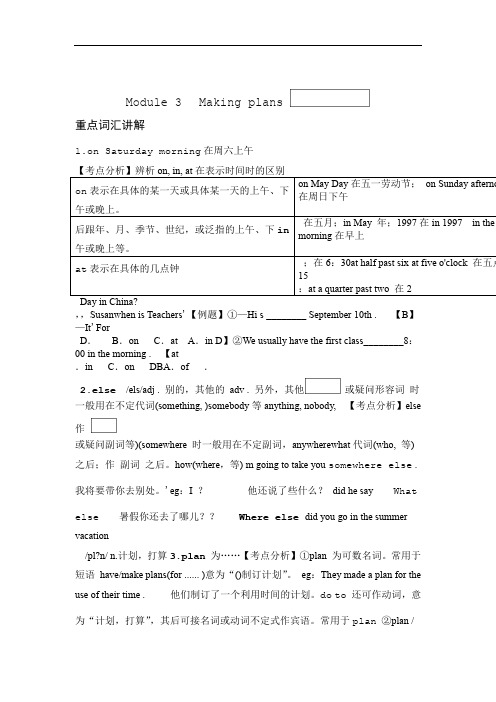
Module 3 Making plans重点词汇讲解1.on Saturday morning在周六上午,,Susanwhen is Teachers'【例题】①—Hi s ________ September 10th . 【B】—It'ForD.B.on C.at A.in D】②We usually have the first class________8:00 in the morning . 【at.in C.on DBA.of.2.else/els/adj . 别的,其他的adv . 另外,其他或疑问形容词时一般用在不定代词(something, )somebody等anything, nobody, 【考点分析】else作或疑问副词等)(somewhere 时一般用在不定副词,anywherewhat代词(who, 等)之后;作副词之后。
how(where,等) m going to take you somewhere else . 我将要带你去别处。
'eg:I ?他还说了些什么?did he say What else暑假你还去了哪儿??Where else did you go in the summer vacation/pl?n/ n.计划,打算3.plan为……【考点分析】①plan 为可数名词。
常用于短语have/make plans(for ...... )意为“()制订计划”。
eg:They made a plan for the use of their time . 他们制订了一个利用时间的计划。
do to 还可作动词,意为“计划,打算”,其后可接名词或动词不定式作宾语。
常用于plan ②plan /打算做某事”。
sth .意为“计划A【例题】The summer holidays are coming . Xiao Li plans ________ on a visit to Hong Kong . 【】going..Ato go B.go C 高频没有什么;没有东西/pron . ?]nothing /'n?θ?4.[是复合不定代词,作主语时,谓语动词用单数形式。
七年级英语下册module3makingplans知识梳理新版外研版

七班级英语下册module3makingplans学问梳理新版外研版MODULE 31. go over 复习2. see a movie 看电影3. help with the housework 帮忙做家务4. have a piano lesson 上钢琴课5. at the weekend 在周末6. have a picnic 野餐7. on Saturday morning 在周六上午8. join us 加入到我们中来9. in the park 在公园10. do one’s homework 做(某人的)家庭作业11. stay at home alone 独自待在家里12. look forward to 期望13. get up late 起床晚14. enjoy oneself 过得开心15. read a book 读书16. May Day(Labor Day) 五一劳动节17. on 2nd May 在五月二日18. go swimming 去游泳19. take a walk 闲逛20. collect litter in the park 在公园里收集垃圾21. go sightseeing 观完22. spend time with family and friends与家人和伴侣们一起度过时间23. make some new friends 结交一些伴侣24. at home 在家25. in the morning of 1stMay 在五月一日的上午26. go on summer camp 去夏令营27. on the beach 在海滩上28. listen to music 听音乐29. travel around the world 环游世界30. play puter games 玩电脑玩耍31. stay in bed 待在床上32. make plans 制定方案33. go for a walk 去闲逛34. have fun 玩得开心重点句子:1. What are you going to do at the weekend?=What are your plans for the weekend?你周末打算做什么?\你周末的方案是什么?2. On Saturday morning, I’m going to check my email and do my homework.在周六上午,我打算查看我的电子邮件并做作业。
精选外研版七年级英语下册Module3Makingplans语言点素材
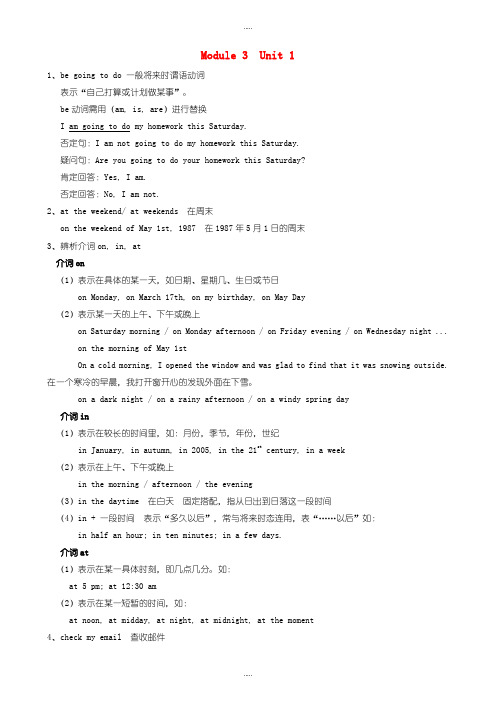
Module 3 Unit 11、be going to do 一般将来时谓语动词表示“自己打算或计划做某事”。
be动词需用(am, is, are)进行替换I am going to do my homework this Saturday.否定句:I am not going to do my homework this Saturday.疑问句:Are you going to do your homework this Saturday?肯定回答:Yes, I am.否定回答:No, I am not.2、at the weekend/ at weekends 在周末on the weekend of May 1st, 1987 在1987年5月1日的周末3、辨析介词on, in, at介词on(1)表示在具体的某一天,如日期、星期几、生日或节日on Monday, on March 17th, on my birthday, on May Day(2)表示某一天的上午、下午或晚上on Saturday morning / on Monday afternoon / on Friday evening / on Wednesday night ... on the morning of May 1stOn a cold morning, I opened the window and was glad to find that it was snowing outside. 在一个寒冷的早晨,我打开窗开心的发现外面在下雪。
on a dark night / on a rainy afternoon / on a windy spring day介词in(1)表示在较长的时间里,如:月份,季节,年份,世纪in January, in autumn, in 2005, in the 21st century, in a week(2)表示在上午、下午或晚上in the morning / afternoon / the evening(3)in the daytime 在白天固定搭配,指从日出到日落这一段时间(4)in + 一段时间表示“多久以后”,常与将来时态连用,表“……以后”如:in half an hour; in ten minutes; in a few days.介词at(1)表示在某一具体时刻,即几点几分。
- 1、下载文档前请自行甄别文档内容的完整性,平台不提供额外的编辑、内容补充、找答案等附加服务。
- 2、"仅部分预览"的文档,不可在线预览部分如存在完整性等问题,可反馈申请退款(可完整预览的文档不适用该条件!)。
- 3、如文档侵犯您的权益,请联系客服反馈,我们会尽快为您处理(人工客服工作时间:9:00-18:30)。
Module 3Making plans重点词汇讲解1.on Saturday morning在周六上午【考点分析】辨析on, in, at 在表示的区on 表示在具体的某一天或具体某一天的上午、下on May Day 在五一;午或晚上。
on Sunday afternoon在周日下午in 后跟年、月、季、世,或泛指的上午、下in 1997 在 1997 年; in May 在五月;午或晚上等。
in the morning 在早上at 表示在具体的几点at five o clock’在五点; at half past six 在 6:30;at a quarter past two 在 2:15【例】①— Hi ,Susan,when is Teachers’ Day in China?— It’ s ________ September 10th . 【B】A . in B. on C.at D.For②We usually have the first class________:800 in the morning .【D】A . of B. in C.on D.at2.else /els/adj . 的,其他的adv . 另外,其他【考点分析】 else作形容一般用在不定代 (something, anything, nobody, somebody等)或疑代 (who, what 等 )之后;作副一般用在不定副 (somewhere,anywhere等)或疑副 (where, how 等)之后。
eg: I’ m going to take you somewhere else.我将要你去。
What else did he say?他了些什么?Where else did you go in the summer vacation?暑假你去了哪儿?3.plan /pl?n/ n. 划,打算【考点分析】① plan 可数名。
常用于短have/make plans(for ...... 意)“ (⋯⋯ )制划”。
eg:They made a plan for the use of their time .他制了一个利用的划。
② plan 可作,意“ 划,打算”,其后可接名或不定式作。
常用于 plan to do sth . 意“ 划 /打算做某事”。
【例】 The summer holidays are coming . Xiao Li plans ________ on a visit to Hong Kong .【 A 】A.to go B.go C.going4.[高 ]nothing /'n?θ ? /pron . 没有什么;没有西【考点分析】①nothing 是复合不定代,作主,用数形式。
eg:Nothing is easy for him .他来,没有什么是容易的。
②被形容修,形容常放在其后,作后置定。
eg:There is nothing wrong with the machine .机器没出什么毛病。
似于 nothing 的复合不定代有:something,somebody,someone(常用于肯定句 );anything,anybody, anyone(常用于否定句或疑句);everything, everybody, everyone等。
【例】 There is ________ in today’s homework .【C】A.difficult nothing B.difficult anything C. nothing difficult D.anything difficult5.alone /?'l??n/ adv .独自地;独地【考点分析】 alone 用作副,但也可作形容,意“独自的”。
alone 只表示“ 独”的客状,没有感情色彩。
【拓展】 lonely 用作形容,意“孤独的,寂寞的”,有感情色彩。
6.[高 ]look forward to盼望,期待【考点分析】①look forward to 后跟名 (短 )或代。
eg:Your mother is looking forward to your letter .你正期待着你的来信。
② look forward to 中 to 介,后跟名。
eg:Yunnan is beautiful and I’m looking forward to visiting it again .云南很美,我正期待着再次参它。
【例】学生都期待着在次考中取得好成。
The students are all looking _____________ to ___________ well in this exam 【. forward;doing】They are looking forward to __________ (win) the first prize in the coming competition . 【winner】7.make friends 交朋友【考点分析】当表示和某人交朋友,用make friends with sb . ,其中 friends 不可数。
eg:He likes to make friends with others .他喜跟人交朋友。
8.wear /we?(r)/ v. 穿,戴;留 (胡等 )【考点分析】 in, put on, wear, dress, have on都含有“穿”之意,但用法不同。
input on wear dress 介,后接表示衣服或色的。
“穿上、戴上”,“穿、戴”的作,后接衣服、鞋帽等。
“穿着;戴着”,表示状,可以是衣帽,也可以是物、章等。
通常是人,意思是“ ⋯⋯穿衣服”。
dress My son is now able to dress himself .oneself 或 get dressed表示⋯⋯穿衣服。
我儿子在自己会穿衣服了。
I’ ll have black pants and a grey shirt onhave on 表示“穿着,戴着”。
tomorrow . 明天我会穿黑色的和一件他什么常戴着深色的太阳?Why does he oftenwear dark sunglasses?如果你出去,穿上你的厚外套。
Put on your heavy coat if you go out .今天他穿着黑色尼克。
He is in a black nylon jacket today .2【例】 Many girls would like to ________ skirts in summer .A.put on B.dress C.have in D.wear9.hope /h??p/v . 希望【考点分析】① hope to do sth . 意“希望做某事”,不能用hope sb. to do sth . 的构,而 wish 可用于固定构wish sb. to do sth. 中,表示“希望某人做某事”。
eg:My brother hopes to go to school by bike .我的弟弟希望自行上学。
What do you wish me to do?你想要我做什么?② hope+ that 从句,意“希望⋯⋯”。
eg: I hope that they can finish the work .我希望他可以完成份工作。
③当你要表示“希望如此。
” ,就“I hope so . ”,其否定形式用“ I hope not . ”。
【例】 She said she hoped ________ her daughter【. A 】A.to see B. you to see C. seeing10.win/w?n/ v.(去式 won);【考点分析】 win 的名形式 winner 者,者辨析 win 与 beatwin后面通常接比、、斗或品等作,不能跟表示I won the match.我得了比。
人的beat 后面接比、或斗的象作,即通常是人或We beat their team by 10 points .我了他十分。
【例】 The Chinese national women’s badminton team ________the Japanese team by :3 1 in India on May 24 .【C】A.won B.lost C. beat D. missed11.enjoy oneself 得愉快【考点分析】① enjoy oneself 中的 oneself 需要随着主人称的化而化。
它的同短: have a good time玩得开心, have fun 玩得高。
eg:He enjoys himself in China . = He has a good time in China . = He has fun in China .他在中国玩得很开心。
② enjoy 常用作及物,意思是“喜”、“ 于”、“享受⋯⋯的趣”。
enjoy 后接名或代。
enjoy 后面也可接的-ing 形式。
【例】 The five boys attended a birthday party last Sunday and they enjoyed ____________ (they)very much .【themselves】12.during /'dj??r?/ prep . 在⋯⋯期【考during in 表示一段,起止分明,其作或状的持性,且常用在季名前,与定冠 the 用。
泛指某一作生在某一段内,且 in 用在季名前,有无定冠均可。
We shall be in London during the summer . 夏季我将在敦。
They usually go on holiday in winter, but last yearthey went on holiday in summer . 他通常在冬天去度假,可是去年他是在夏天去度的假。
13.spend /spend/ v.花① sb. spend(s)... on sth .某人某物花⋯⋯eg:Mr. Li spends 20 dollars on the book .②sb. spend(s)... (in)doing sth . 某人花⋯⋯干某事14.It ’s time for .......到⋯⋯的候了【考点分析】辨析It ’s time (for sb . ) to ......与 It ’s time for .......It’s time (for sb . ) to ......跟的是,意思是“到(某人)做某事的候了。
